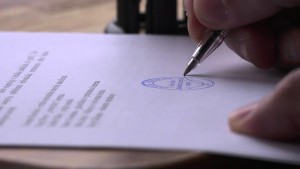 Any legal documents that originated in the US must be properly legalized, or authenticated, prior to being used in China.
Any legal documents that originated in the US must be properly legalized, or authenticated, prior to being used in China. Examples of documents that might need to be authenticated include (but are not limited to) birth certificates, marriage certificates, higher education diplomas, and professional qualifications or certifications.
Since China is not a member of the Hague Convention, apostille is not considered an acceptable way to authenticate documents for use in the country. Instead, the documents must go through a three part process that is referred to as authentication. These steps are outlined below:
- Notarization. Non-government issued documents such as professional certifications, power of attorney, and bank letters must first be notarized. Government-issued documents such as birth certificates do not require notarization assuming you possess a certified copy that was obtained from the state in which you reside (or did reside).
- State Certification. With notarized or certified copies in hand, the Secretary of State Office must then certify the notary seal or certified copy by adding a statement page. Some states require that a county clerk first certify the notary seal as well. Some states also require certification at the federal level for additional authentication. This is referred to as requesting authentication from the US Department of State.
- Consulate Authentication. The next step is to bring or send the certified documents to the Chinese Embassy or Consulate. The signatures and seal of the Secretary of State Office are verified and then the document is authenticated for use in China.
These are the basic steps required to authenticate official documents for recognition in China. From finding employment to securing housing, these documents must be authenticated prior to being accepted as legal documentation in China.
This process requires multiple trips to various government entities at both the state and federal level. You can mail these items but it takes a lot longer than hand delivering the documents at each step along the journey.
One of the easiest ways to obtain legalization of documents for China is to hire a professional authentication services company. US Authentication Services offers document legalization services in Washington, DC and can deliver your important documents to every appropriate entity in the authentication process. This ensures that everything is done right the first time and it saves you a lot of time too.
If you want to learn more about how US Authentication Services can streamline the authentication of your documents for use in China, give us a call at 1-800-890-5807 or contact us for a FREE QUOTE today.
 Any legal documents that originated in the US must be properly legalized, or authenticated, prior to being used in China. Examples of documents that might need to be authenticated include (but are not limited to) birth certificates, marriage certificates, higher education diplomas, and professional qualifications or certifications.
Since China is not a member of the Hague Convention, apostille is not considered an acceptable way to authenticate documents for use in the country. Instead, the documents must go through a three part process that is referred to as authentication. These steps are outlined below:
Any legal documents that originated in the US must be properly legalized, or authenticated, prior to being used in China. Examples of documents that might need to be authenticated include (but are not limited to) birth certificates, marriage certificates, higher education diplomas, and professional qualifications or certifications.
Since China is not a member of the Hague Convention, apostille is not considered an acceptable way to authenticate documents for use in the country. Instead, the documents must go through a three part process that is referred to as authentication. These steps are outlined below:

